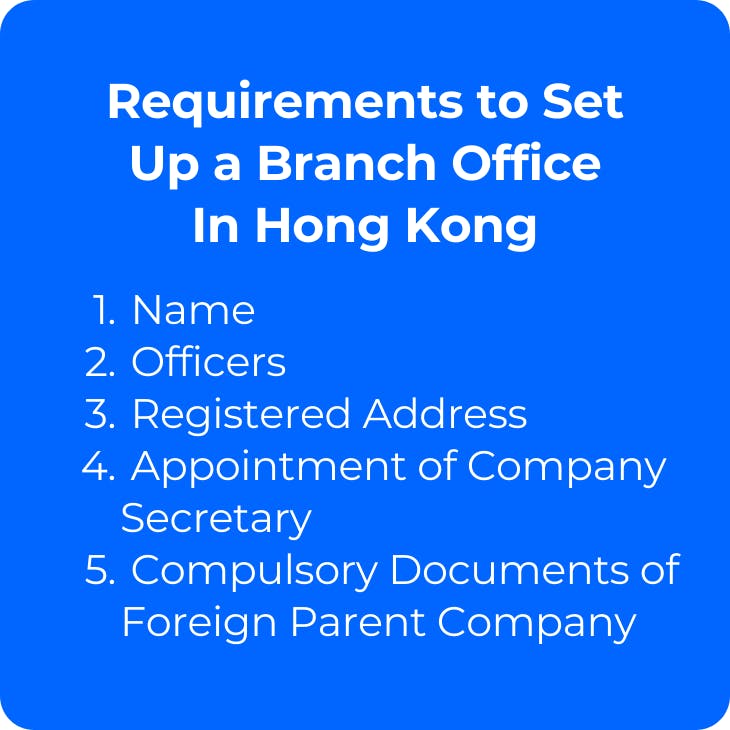A branch office is a location for a business, other than its main office, that conducts some or all of the same business activities.
Branch offices offer quicker registration, fewer capital requirements, direct parent company control, and tax advantages.
Benefits include no minimum capital requirement, straightforward registration, direct parent company involvement, favorable tax treatment, and easier closure procedures.
Compliance obligations include obtaining a Business Registration Certificate, displaying the parent company's name, notifying the Companies Registry of changes, filing annual account statements and tax returns, and potentially applying for a business license.
Setting up a branch office is an efficient way to enter the Hong Kong market, with support available from services like Air Corporate for registration and ongoing compliance.
Any foreign company keen to do business in Hong Kong can do it in a couple of ways.
One of the simplest modes available for various business entities is setting up a company branch, a popular option for expanding business.
A branch office in Hong Kong is an easier way to enter the market and carry out the same business as the parent company.
Compared to a subsidiary, the registration procedure of a Hong Kong branch office is also straightforward.
Here is what you need to know to set up a branch office in Hong Kong.
What Is a Branch Office?
Legally, a branch office functions as an extension of a corporate entity, allowing it to carry out the same business in a foreign jurisdiction.
As an extension of an existing business, it carries out identical business operations but in a different physical location. So, if your company is set up in Japan, you can establish a branch in Singapore.
But, unlike a wholly owned subsidiary, a separate legal entity incorporated in a foreign jurisdiction, a branch doesn't have a separate legal identity.
Foreign companies can also enter a new market through their representative office, in addition to setting up a subsidiary company or a branch office.
It is the preferred choice if the foreign company doesn't want to execute any contracts in Hong Kong but merely wants a way to look for potential customers and make them aware of its business.
Why Choose a Branch Office?
Usually, larger corporations looking to gain a foothold in a new market opt for a branch over other modes of setting up a business.
Here are some common reasons why they do that:
- Registering a subsidiary takes longer compared to registering a branch
- Some countries prescribe minimum capital requirements for subsidiary registration.
- The parent company exercises more control since a branch office represents the parent company and is directly tied to it
- It is a great way to test a new market and diversify without making a huge commitment
- Registration documents of the parent company are sufficient for establishing a branch in most countries
- Tax advantages under local tax regulations and double taxation avoidance treaties apply to branches
- Share transfers in a subsidiary company attract stamp duty. However, no stamp duty is payable for transferring a Hong Kong business operated by a foreign company through its branch.
- Closing down a branch is easier than closing down a subsidiary.

Requirements to Follow When Setting Up a Branch Office In Hong Kong
To set up a branch office in HK, the foreign company must first register as a non-Hong Kong company with the Companies Registry.
Here's what you need to do:
Name
Since a branch office is not a separate legal entity, it cannot have a different name.
The branch office's name should be the same as that of its parent company, as this is the name that appears on the parent company's incorporation certificate.
Companies Registry can reject a company name if it is already registered or if it is improper or misleading. Always perform a name search on the Companies Registry website before you apply.
Also, note that registering a company name with the Registry doesn't grant the parent or the branch office any trademark or other intellectual property rights over the name.
Officers
At least one Hong Kong resident should act as the official representative to receive legal notices on behalf of the foreign company.
Companies can appoint either an individual or a company for this position.
Registered Address
A branch office should have a physical address in Hong Kong. It serves as the business address of the parent company in Hong Kong. Having a PO box address is insufficient to fulfill the requirement.
Typically, most non-Hong Kong companies use the address of a professional firm as the branch's address. This is a temporary measure before the branch establishes an actual place of business.
Appointment of Company Secretary
The foreign company should appoint a local firm or individual as the company secretary of the branch to take care of various compliance requirements.
Compulsory Documents of Foreign Parent Company
The following documents are mandatory for setting up branch offices:
- Copies of the parent company's Memorandum and Articles of Association
- Copy of the original incorporation certificate
- A business registration certificate
- Details of the company directors
- Latest account statements
Any document submitted should be certified to be true and be either in English or Mandarin.
What Are the Benefits of Setting Up a Hong Kong Branch Office?
Here are the benefits foreign investors enjoy when they opt for a branch office in Hong Kong:
- No minimum capital requirement
- The registration process is straightforward
- There is greater scope for business opportunities as branch offices leverages the parent company's name to enter into transactions
- The parent company remains directly involved with the management of the branch office, with the head office in control over its operations
- No ongoing maintenance expenses associated with a branch as Hong Kong law does not prescribe a separate branch audit
- Compliance with limited provisions of the Hong Kong Companies Ordinance is sufficient
- The Inland Revenue Department offers a favorable tax treatment as only profits earned in Hong Kong are subject to tax.
- A branch office can also benefit from the double taxation avoidance treaties Hong Kong has, with over 40 countries.
- Branch office registration doesn't require any statutory documents apart from the parent company's constitutional documents and its business registration certificate, and
- Shutting down a branch only involves notifying regulatory authorities such as the Companies Registry and the Inland Revenue Department, within 7 days after cessation of business.
What Are the Compliance Obligations of a Hong Kong Branch Office?
A branch office has the same compliance obligations as local companies in Hong Kong.
Here are a few examples:
- The foreign company must apply for a Business Registration Certificate from the Inland Revenue Department one month after the branch begins its operations. The certificate should be displayed on the branch office premises.
- The branch should include the parent company's name and the place of its incorporation on its letterhead.
- The parent company should inform the Companies Registry about any changes to the management structure of the branch.
- The branch office should open a corporate account at a local bank. A well-established business account allows the branch to carry out business activities on behalf of the parent company.
- A branch office should file annual account statements with the Companies Registry. A director, company secretary, or authorized representative should sign the accounts before filing. However, if the parent company is not obligated to file account statements with any regulatory body in the country of its incorporation, the branch office is exempt from filing account statements in Hong Kong. A branch should also file tax returns with the Inland Revenue Department.
- The branch must file the details of any assets secured or acquired with the Registrar of Charges, within 1 month from the charge creation or acquisition date.
- If required, a branch office should apply for a business license. Business licenses are mandatory if the parent company operates in any of the following sectors. Click here to see the list of sectors.
- Once a branch is shut down, the parent company should settle any pending taxes or returns. An authorized representative of the branch can act as the process agent for at least 11 months after the cessation of business to receive notices from relevant authorities.
Set Up a Branch Office In Hong Kong Today
Hong Kong is an attractive destination for any business entity that wants to establish its presence in the Asia Pacific region.
If you don't want to set up a subsidiary company right away, opting for a branch office in Hong Kong is an easy way to start business operations.
However, you must carefully consider what's best for your company, keeping in mind your business goals.
Not sure if a branch office is a safe bet for you? Get in touch with Air Corporate today to learn more about what you can do for your business.
We provide a range of secretarial services for Hong Kong foreign companies, including setting up a branch.
We also help set up a corporate bank account to support your banking needs. Partner with us to enjoy peace of mind when you do business in Hong Kong.
FAQs
Registration takes approximately 2 weeks. The exact timeline varies on a case-to-case basis.
A branch office has no legal identity. As a result, the parent company is fully liable for any actions taken or debts incurred by its Hong Kong branch. The parent company is also legally bound by all contracts that its branch executes.
In the case of subsidiary companies, the parent doesn't have any legal obligations. Since the subsidiary company maintains a distinct legal identity, none of its actions are legally binding on the parent.
Yes, as there are no exchange control regulations in Hong Kong. There are no restrictions on sending remittances abroad.
But any profit generated abroad remains subject to applicable tax regulations of the country that receives the money.



